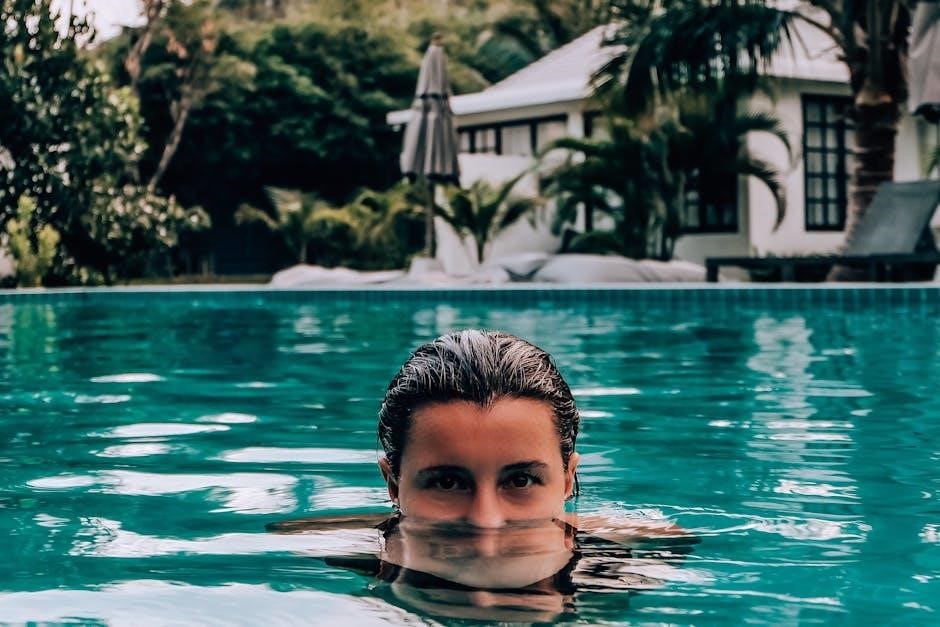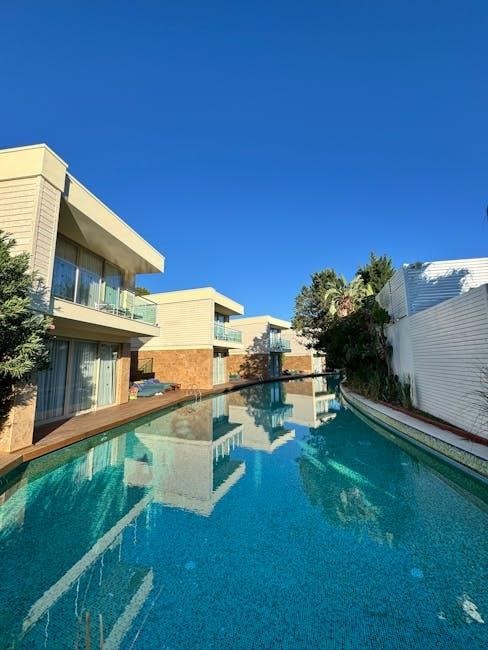Pennsylvania residential pool regulations pdf provides information on safety laws and installation requirements for pool owners, ensuring a secure environment for residents, using
specific guidelines
and codes.
Overview of Pool Safety Laws
Pool safety laws in Pennsylvania are designed to protect residents from accidents and injuries. The laws outline specific requirements for pool installation, maintenance, and operation. According to the Pennsylvania residential pool regulations pdf, pool owners must comply with the Public Bathing Law and the International Swimming Pool and Spa Code. The regulations also require pool owners to install barriers, such as fences, to prevent unauthorized access to the pool. Additionally, the laws require pool owners to ensure that their pools are properly maintained and that safety equipment, such as lifesaving devices, are readily available. The regulations are enforced by local authorities, and pool owners who fail to comply may face penalties and fines. Overall, the pool safety laws in Pennsylvania are intended to promote a safe and healthy environment for residents. The laws are regularly updated to reflect changes in technology and safety standards.

Pool Installation Regulations
Pool installation regulations require barriers and specific codes, using
relevant guidelines
for safety and compliance, in Pennsylvania residential areas always.
Barrier Requirements for Pool Safety
Barrier requirements for pool safety are crucial in preventing accidents and ensuring compliance with Pennsylvania residential pool regulations. The International Swimming Pool and Spa Code provides guidelines for barrier installation, including a minimum height of 48 inches from grade to the top of the pool wall. Pool owners must also provide documentation from the manufacturer allowing the pool wall to serve as a barrier. In addition, the barrier must be installed around the entire pool, with some exceptions for pools dug into slopes. The Pennsylvania Department of Labor and Industry enforces these regulations to ensure pool safety and prevent accidents. Pool owners can refer to the Pennsylvania residential pool regulations pdf for more information on barrier requirements and other safety guidelines. By following these regulations, pool owners can help prevent accidents and ensure a safe environment for residents. Pool safety is a top priority.

Pool Height and Fencing Requirements
Pennsylvania requires pool fencing to be at least 48 inches high, with specific guidelines outlined in the regulations, ensuring pool safety and compliance.
Documentation from Pool Manufacturers
Pool manufacturers must provide documentation, such as a letter, to allow the pool wall to serve as a barrier, ensuring compliance with Pennsylvania residential pool regulations. This documentation is crucial in verifying that the pool meets the necessary safety standards. The pool manufacturer’s letter must be submitted to the relevant authorities, providing details about the pool’s design and construction. The documentation should include information about the pool’s height, fencing, and other safety features. By requiring this documentation, Pennsylvania aims to ensure that all pools are safe and secure for residents; The documentation process helps to prevent accidents and ensures that pool owners are aware of their responsibilities. Pool manufacturers must adhere to these regulations, providing the necessary documentation to facilitate compliance with Pennsylvania residential pool regulations. The documentation is an essential part of the pool installation process.

Public Bathing Law and International Codes
Pennsylvania adopts the 2018 International Swimming Pool and Spa Code, following public bathing laws and international codes for pool safety and regulations, using
- specific
guidelines.
Adoption of 2018 International Swimming Pool and Spa Code
The adoption of the 2018 International Swimming Pool and Spa Code is a significant development in Pennsylvania’s residential pool regulations, aiming to enhance pool safety and compliance. This code provides a comprehensive framework for the design, installation, and maintenance of swimming pools and spas. The code’s provisions address various aspects, including pool barriers, fencing, and equipment. By adopting this code, Pennsylvania ensures that its residential pool regulations are aligned with international standards, promoting a safer environment for pool users. The code’s guidelines are enforceable, and pool owners are required to comply with its provisions to avoid penalties. The adoption of this code is a crucial step towards preventing accidents and ensuring that residential pools in Pennsylvania are safe and secure, with
clear guidelines
and regulations in place. This code is widely recognized and adopted by many states, and its implementation is expected to have a positive impact on pool safety in Pennsylvania.

Pennsylvania Residential Code and Amendments
Pennsylvania adopts International Residential Code with amendments, using
- specific
guidelines for construction and installation, ensuring compliance with state regulations and codes, for a safer environment always exists.
International Residential Code 2009 and Electric Wiring
The International Residential Code 2009 provides guidelines for electric wiring in residential pools, ensuring safety and compliance with regulations. The code outlines specific requirements for wiring and equipment, including grounding and bonding. In Pennsylvania, the code is adopted with amendments to ensure consistency with state laws and regulations. The electric wiring provisions are designed to prevent electrical shocks and accidents, and to provide a safe environment for pool users. The code also requires that all electrical equipment be installed and maintained in accordance with the manufacturer’s instructions and industry standards. By following the International Residential Code 2009, pool owners and installers can ensure that their pools are safe and compliant with regulations, using tables and
- lists
to organize the information. This helps to prevent accidents and ensures a safe and enjoyable pool experience.
Accessibility Provisions and ADA Guidelines
Pool owners must follow American with Disabilities Act guidelines using specific codes and regulations always.
General Design Requirements for Pool Accessibility
The general design requirements for pool accessibility in Pennsylvania are outlined in the International Swimming Pool and Spa Code, which provides guidelines for making pools accessible to people with disabilities. Pool owners must ensure that their pools are designed and constructed to meet these requirements, which include provisions for accessible entry and exit points, such as ramps or lifts. The code also requires that pools have a minimum number of accessible seating areas and that the pool deck be designed to accommodate wheelchairs and other mobility aids. Additionally, the code provides guidelines for the design of pool equipment, such as pumps and filters, to ensure that they are accessible and usable by people with disabilities. By following these guidelines, pool owners can help ensure that their pools are safe and accessible for everyone. Using specific codes is always necessary.
State and Federal Regulations for Pool Safety
Regulations are enforced by state and federal agencies using codes to ensure pool safety standards.
Government Websites and Resources for Pool Owners
Pool owners can access various government websites and resources to obtain information on pennsylvania residential pool regulations pdf, including the official Pennsylvania government website, which provides details on pool safety laws and regulations. The website offers a range of resources, such as downloadable pdf documents, FAQs, and contact information for relevant agencies. Additionally, the website provides links to other relevant websites, including the International Code Council and the American National Standards Institute, which offer guidance on pool safety standards and best practices. By utilizing these resources, pool owners can ensure compliance with regulations and create a safe environment for themselves and their guests. The government websites and resources are regularly updated to reflect changes in regulations and laws, making them a reliable source of information for pool owners. Pool owners can also find information on permitting and inspection requirements.
